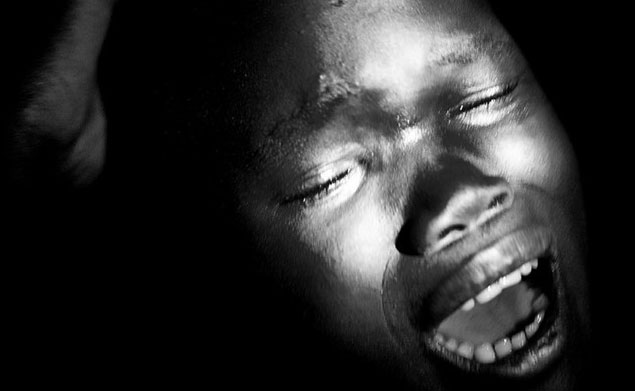Recentemente mi sono imbattuto in un rapporto della BBC "investigativo" sulla questione della sacrificio bambino da 'stregoni’ in Uganda e guardato il video con disgusto totale! Dopo aver visto il video, Mi sono ricordato di quando sono andato al negozio con un amico, che è stato interrogato dal giovane curioso cassiere afro-americano. Ha chiesto la orijin del bracciale che indossava e quando ha risposto dichiarando "Ghana, Africa; si dovrebbe andare lì un giorno,"Lei lo guardò con disgusto e rispose:" uh uh ... io non voglio andare in Africa. "Notando che egli sia dal posto molto lei ovviamente disapprova, ha cambiato il suo tono e ha tentato di pacificare la situazione ulteriormente dichiarando che lei non voleva lasciare gli Stati Uniti. Dopo la visione di un video, ad esempio inquietante, perché qualcuno dovrebbe voler andare in Uganda o dovunque in Africa per quella materia?! Un luogo dove 'loro' fanno tali riti barbarici e disumane, come sacrifici di bambini? Un luogo dove 'loro' hanno 'stregoni;'Dove la gente con i soldi rapiscono e uccidono bambini a scopi sacrificali, nella speranza di raggiungere la ricchezza e prosperità? WTF è sbagliato con 'queste' persone?! Se la vostra comprensione dell'Uganda o in Africa si limita al campo di applicazione se questo video, allora la risposta di cui sopra è giustificata. Se siete ben informati circa l'Africa e guardato il video con Fela Kuti'S la dichiarazione che "99.9% delle informazioni si ottiene circa l'Africa è sbagliato"In mente, allora si avrà domande circa l'impatto negativo che avrà sul ugandesi e africani e la misura in cui essa ulteriori exoticizes e perpetua gli stereotipi negativi di africani. Io non sono la posizione che tutti sono fuori per "ottenere" l'Africa e che tutto fatto a mettere in discussione la cultura e le pratiche africana è fatto per cattiveria. Io sono consapevole del fatto che ci sono alcune pratiche culturali che sono disumane, indipendentemente dal loro background culturale e storico. Tuttavia, Credo che qualsiasi problema circostante o criticare la cultura dovrebbe essere fatto in modo onnicomprensivo e ben informati. La linea di fondo è che la pratica dei sacrifici di bambini è una barbarie e decisamente sbagliato. Tuttavia, in questo recente 2011 relazione della BBC e la relazione precedente sullo stesso argomento in 2010, Sono anche disturbato dal fatto che: 1) Esso non fornisce alcuna base sulla pratica del bambino e sacrifici umani e lascia l'impressione che sia solo insita in Uganda e per molti, per estensione in Africa 2) Il "indagine" è fatto con l'ingresso di un gruppo molto selettiva di persone, la maggior parte dei quali che hanno molto da guadagnare esagerando e semplificando la pratica 3) Esso fornisce una visione miope del problema generale della scomparsa bambino in Uganda e lascia l'impressione che tutte le sparizioni dei bambini sono legati a loro di essere sacrificati 4) Suo campo di applicazione limitato della pratica del sacrificio di bambini e la sua ascesa apparente e la prevalenza in Uganda rafforza l'idea attribuita agli africani di ideologia razzista che sono "pagani barbari e selvaggi"

Sacrificio Bambino: foto di Marco Vernaschi
La pratica di bambino o il sacrificio umano non si limita ai confini dell'Uganda o per il continente africano. Infatti, ci sono abbondanti quantità di documenti storici sulla pratica nelle diverse culture di tutto il mondo. Per esempio, la cultura Inca sacrificato bambini in un rituale chiamato capacoha; secondo le fonti romane e greche ben documentati, Fenici e Cartaginesi sacrificavano i bambini ai loro dei; gli antichi cinesi sono anche noti per aver fatto sacrifici di giovani uomini e donne alle divinità fluviali e anche la Bibbia, in Genesi 22, makes reference to the practice of child sacrifice. My point in mentioning all of this is to show that this cruel and barbaric practice is not inherent to Africa as might be interpreted by the video. Dopo aver visto il video, I also did some research as I was sure that I was not the only one left these aforementioned concerns. In confirmation of my belief, I came across a brief response in the journal Anthropology Todayby Pat Caplan where he addresses the concerns expressed by fellow anthropologist, including himself, about this BBC “investigative” report surrounding child sacrifice in Uganda. He noted that “a number of distinguished Africanist anthropologist” criticized the original report on the issue after it was published in 2010 for “reinforcing existing prejudices and stereotypes held by non-Africans, especially Westerners” and branded such reports as being “dangerous” as they “often encourage mob justice.” These anthropologists also expressed concerns over the fact that experts like themselves, who are every knowledgeable about the history and culture surrounding the practice and it’s perceived prevalence in Uganda, were not consulted to give an all encompassing and less exoticized understanding of the issue. They also noted that a similar story, ostensibly documenting accusations of Satanic abuse of children in Africa, was published in the UK two decades ago but was later proven to be false in a report commissioned by the government and anthropologist Jean La Fontaine in 1994. The article also raised the very important point that the local players who served as “experts” in these reports by the BBC such as the government minister, NGOs/INGOs and churches, as they play a very prominent role in Uganda’s welfare system than in the West and as a result, are highly dependent on foreign donors. Quindi, their agendas should be called into question. Inoltre, the story of the reformed ‘witch doctor’ that he killed more than 70 children and “reformed” 2400 ‘witch doctors’ should also be scrutinized as it has been confessed by many of these “witch doctors” that a great number of the killings for which they boasted were lies told as a means to enhance their reputations.

Sacrificio Bambino: foto di Marco Vernaschi
The video also fails to provide alternate explanations surrounded the issue of child disappearances and gives the perception that most, if not all, child disappearances in Uganda are the result of child sacrifices. They failed to take into account that issues such as child trafficking; the taking of body parts for underground international trade, war and other issues could have contributed to the disappearances of missing children in Uganda. To insinuate that all or most child disappearances in the country result from the practice of child sacrifice, directs attention away from other important issues surrounding children and their safety in Uganda. Caplan also states that, according to Ugandans anthropologist, Agnes Kamya, in her own inquires into the issue of child sacrifice for the purposes of witchcraft, she has been told that it is unknown in Ugandan culture and that it has been theorized that it has a “great deal to do with the ubiquity of popular Nigerian films and soap operas in which occult practices – including child sacrifice- often feature. Inoltre, it is estimated that over 85% of Ugandans are Christians, over 12% or Muslims and only about 1% adhere to just traditional cultural practices. Quindi, only a very small percentage will pursue and practice traditional practice such as child sacrifices as for most, the practice goes against their religious beliefs. I am not discrediting the stories of any of the individuals in the video nor am I questioning whether the practice of child sacrifice exists in Uganda. Infatti, I do believe that there are a selected few who partake in this practice and share the view that it is barbaric and inhumane and that all possible measures need to be explored and enforced to ensure its abolished. I also believe all responses to and objections to the practice, whether it’s conducted on one or 1 million children, are warranted. What I do object against, tuttavia, are reports that not only provide a myopic and generalized view of an entire country and by extension, continent. I also object to the fact that this narrow-minded view further helps to perpetuate preexisting negative stereotypes. One would think that after the release of the initial story in 2010 and the criticism that followed, that the BBC would have addressed the issues in a different manner; one that would have taken the expressed concerns into consideration. Tuttavia, in a world where people find it difficult to indulge in anything more than 140 characters, one could only speculate about their choice of “reporting.” The great Benjamin Franklin cautioned us to “believe none of what you see and half of what you hear.” While the issue of child sacrifice is real and awareness if the issue is important in helping to curb the practice, we should also be mindful of how these issues are presented to us and we should be cognizant of the fact that they can often have far reaching consequences not only on the direct victim, but an entire population.

Sacrificio Bambino: foto di Marco Vernaschi

Ultimi post di Non cambiare (vedi tutti)
- Prima di Rihanna era Grace Jones - Dicembre 27, 2014
- Marimba: Espressione di libertà, eppure i miei afro-ecuadoriani… - Dicembre 25, 2014
- Chi fa pretesa di essere il Reggae capitale del mondo? - Dicembre 24, 2014








